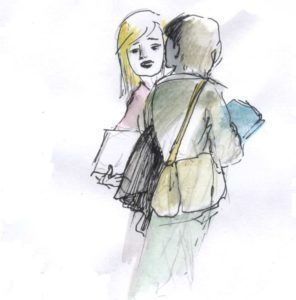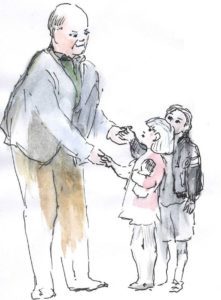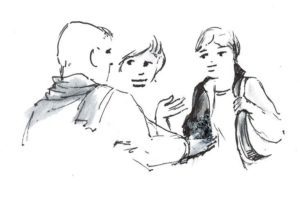1.2 Greetings
Vocabulary
Review the following vocabulary words related to greetings.
| ENGLISH | FRENCH |
|---|---|
| Monsieur / Madame / Mademoiselle | Sir / Mrs. / Miss |
| Bonjour, Monsieur | Hello, Sir |
| Bonsoir | Good evening |
| Au revoir | Goodbye |
| Salut! | Hi! or Bye! |
| À tout à l’heure! | See you in a little while. (same day) |
| À ce soir. | See you this evening. |
| À demain. | See you tomorrow. |
| À bientôt. | See you soon. |
| Comment vous appelez-vous? | What’s your name? (formal) |
| Comment tu t’appelles? | What’s your name? (informal) |
| Je m’appelle… | My name is… |
| Comment ça va ? / Ça va ? | How are you? |
| Comment allez-vous ? | How are you? (formal) |
| Comment vas-tu ? | How are you? (informal) |
| Je vais très bien, merci. | I am very well, thank you. |
| Je vais bien, merci. | I am fine, thank you. |
| Pas mal, merci. | Not bad, thank you. |
| Bien, merci! | Great, thanks! |
| Ça va. | O.K. |
| Ça va bien/mal. | Good / bad |
| Comme ci, comme ça. | So-so |
| Et vous ? / Et toi ? | And you? (formal/informal) |
‘Tu’ ou ‘Vous’?: Forms of Address
In general, ‘tu’ is used with friends, family, and children. ‘Vous’ is used to express politeness, formality, and social distance. In Quebec, the use of ‘tu’ is far more common, though ‘vous’ is still used to show respect.
Notes of French Culture
Linguistic differences can teach us a great deal about cultural differences. Do you think it is significant that French-speaking cultures have two different words for “you,” while English-speaking cultures do not, or do you think it’s just a coincidence? How does English distinguish formal from informal relationships?
Exercice 2: Formal vs informal
Discuss whether the person speaking in each of the following situations would use tu or vous.
- A client in a bakery, speaking to the baker.
- A doctor speaking to a patient.
- An elementary school student speaking to three of her friends.
- A college student speaking to a professor.
- A telemarketer speaking to the person they call.
- A politician making a public speech.
- A mother speaking to her daughter.
- A father speaking to his two sons.
- A college student speaking to another college student in class.
- A professor speaking to her entire class.
Exercice 3: Bonjour!
Part A
Observe the image and read the accompanying dialogue. Determine if it is a formal or informal exchange.

Marc: Salut, Christophe !
Christophe: Ah, bonjour, Marc! Ça va?
Marc: Comme ci, comme ça. Et toi, Christophe? Comment ça va?
Christophe: Ça va bien, merci.
Marc: Au revoir.
Christophe: Salut.
Part B
Replace the names in the previous dialogue with your own name and that of a classmate. Practice it and present it to the class!
Part C
Write a brief dialogue for each of the situations below. Don’t forget to decide whether the situation requires a formal or informal form of address.
- Figure 1.3. Two students talk as they pass each other.
- Figure 1.3. A grandfather holds hands with his two grandchildren.
- Figure 1.2. A business man shakes hands with two clients.
- Figure 1.4. Three people have a conversation outdoors.
*
*
Notes on French Culture
La Bise (Kiss)
In many French-speaking countries, people kiss each other on the cheek or shake hands when they meet. In everyday situations, female friends kiss, while men and mixed couples will kiss or shake hands depending on their level of acquaintance. This action is expressed by the French phrase ‘faire la bise’. While the number of kisses exchanged varies by region, the most common practice is two kisses, one on each cheek, although it is not uncommon to exchange three or even four. In an informal situation, young adults will most often ‘faire la bise’. Older adults or men would normally shake hands. In a formal situation, it is necessary to shake hands with everyone.
This section includes content derived from Liberté, originally released under CC BY-NC-SA, and Francais Interactif, originally released under CC-BY.





